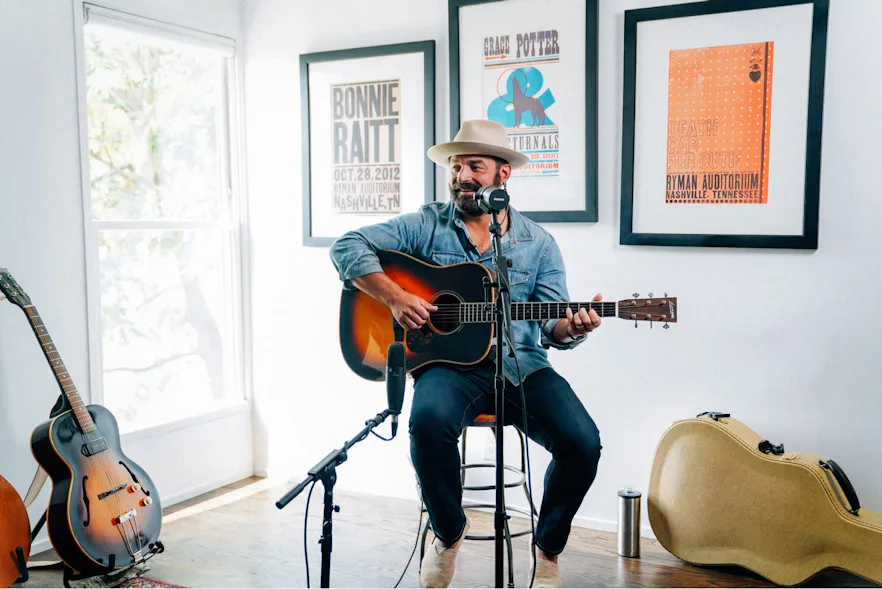I consider the first time I met Drew Holcomb to be from my small grey IKEA recliner in California, with my phone propped up on the arm of the chair, watching him and his wife Ellie sing on Instagram Live the week of March 2020 when the world shut down.
They were some of the first artists to comfort the world through song, remotely – stemming in part from Drew’s understanding that music offers hope in tough times, something he learned when he was 17 and lost his younger brother, Jay.
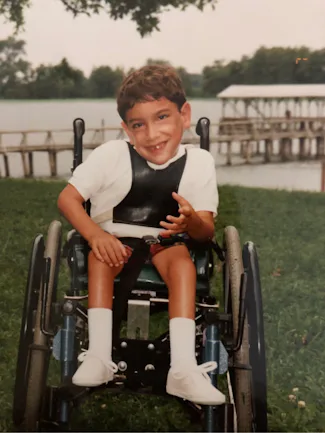
Jay
Today, I’m sitting on another grey chair, but this time in Drew’s home office. It’s an upstairs loft apartment behind his house, a former Airbnb they rented out. Once a renter saw Drew in his garage and said, “Hey you look like Drew Holcomb. Are you?” Drew paused, looked him straight in the eye, and said, “No”.
Drew is about to play a few songs and tell a few stories for his second Kit Creator Session; the interview will happen after.
Drew first greets me and the Creator Sessions crew wearing a Moon River Festival T-shirt, from the annual Tennessee music festival he started in 2014.
He changes into a jean collared shirt for the Creator Session and spends all his time during setup, audio checks, and breaks between takes strumming the guitar as if no one is there, lost in the music.
Drew is stoic in person, but when he sings or talks about his artist journey, you get the sense his work is powerful because he shares in it parts of himself only music can hold.
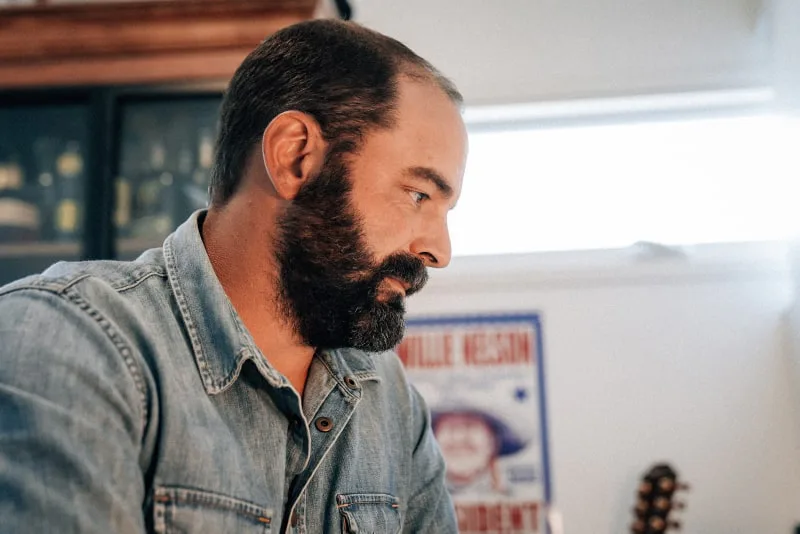
He doesn’t smile often, but he’s deeply warm, calm, and kind.
And when he does smile, it feels like winning a small carnival prize: against the odds, but earned.
He shares that his wife Ellie explains it best: he’s “not a glass-half-empty or half-full person. To him: ‘The glass has water in it.’”
It’s not surprising then that growing up everyone, including Drew, assumed he’d be a lawyer.
“Some people say faith is a childish game/”
In high school, Drew was an “extroverted bookworm”- a class president and student athlete who spent his free time reading encyclopedias.
He also loved to argue. A future in law made sense.
Back then music was purely a source of comfort. It helped him through the incredible grief of losing his brother, and was something he did as an act of service, playing once in a while at church.
But he did have the smallest inkling that music could be a career when he bought his first car – a Jeep. Drew asked the seller what he did for a living, and he answered:
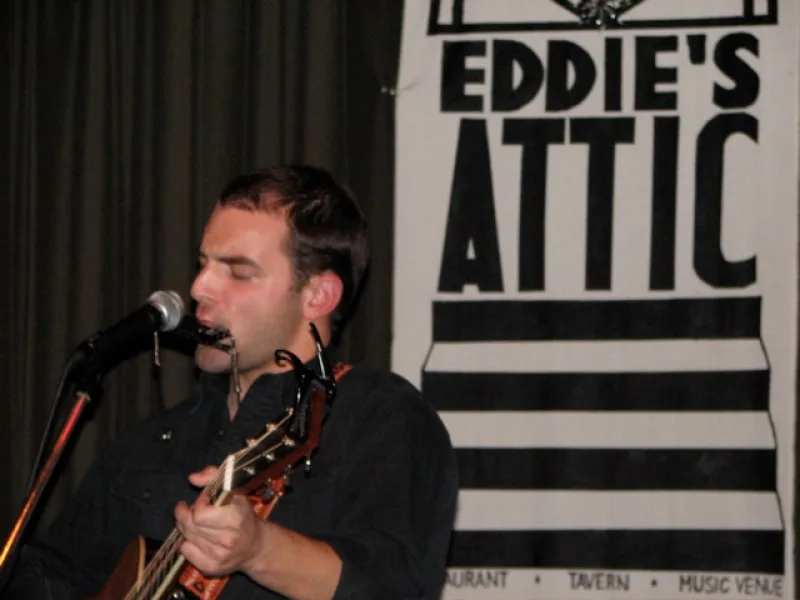
“I’m a music producer.”
“What does that mean?” Drew asked.
“Come to the studio sometime.”
He did and was enamored by watching bands record there. He and the producer stayed in touch.
In college, wanting to offer the world something of what music offered him during the darkest time of his life, Drew started writing his own songs.
But people were a bit confused: “The Lawyer”, as they’d come to think of him, is writing songs?
Everybody, even my college friends, saw it as just a diversion. And I honestly saw it as a diversion.
But soon it became more than a diversion for Drew. It became a way to communicate. And he loved it more than anything else he was doing at the time.
After college, he decided to put off graduate school and took a job working at the studio of that music producer. The producer listened to some of Drew’s songs and said, “Your songs are not bad.” Drew clarifies: “He didn’t quite say they were good.”
But he did say there was something there, and that Drew should think about pursuing music professionally.
That encouragement from a professional in the business was enough for Drew to go on. He decided, with as much commitment and dedication as someone choosing law school, that he was going to pursue a music career instead.
Now he just had to tell his dad.
“I’m only getting started on this lost highway/”
Drew took his dad out to breakfast in his hometown of Memphis to break the news.
My dad was sort of a music lover, but he’s honestly a little tone deaf. And he’s a dentist. So a tone deaf dentist is taken to breakfast by his son to tell him that he just graduated college and wants to be a troubadour.
Drew told his dad about his “dream of being a singer/songwriter.”

His dad listened intently and then asked him one question:
“Are you going to work hard at it?”
“Yes,” Drew answered, “I am.”
“Well, let’s go to the guitar shop. If you’re gonna work hard at it then I’m in your corner.”
Then his dad added:
But promise me if it ever gets to where you know it’s not gonna work, you’ll have the courage to walk away from it. Music is a really hard job and it doesn’t always happen for everybody. And it requires not only talent, but a good bit of luck. Just promise me that you’ll know when to walk away if you need to.
Drew promised, and then they went to the guitar shop and bought a Larrivee D60.
It was the official start of his music career. The first and most important step he took, he remembers, was writing more songs. But he knew that was only the first of many steps.
No one who wants to be an artist is like, ‘You know what I want to do? I want to run a small business.’ But you are choosing to run a small business if you’re choosing to be an independent contractor or creative.
Now that he was taking his music career seriously, there was a lot more to do and learn, especially related to connecting his music to an audience: “You have to put yourself out there, and that’s scary.”
He got a website. He set up his MySpace page.
And then you get no response, and it’s hard not to take that personally.
He wondered:
Can I make a living doing the thing that I love? Can I make music that is authentic and is true to who I am as a person, to who I want to be as a creator, while also challenging myself to grow? And can I do that with enough fans to pay the bills, enough people buying the music?
“We want the spark but we don’t want the burn/”
He kept going. Next he hired a band, but when some band members didn’t work out, he had to go through that painful process of letting people go.
People want their dreams to come true, then they realize sometimes managing a dream come true is a nightmare.
But he eventually did find the right members for the band – called Drew Holcomb and The Neighbors – and they played bar gigs and community colleges, and even got a few songs on TV a few times a year, which helped them all stay financially afloat. They lived month to month for many years.
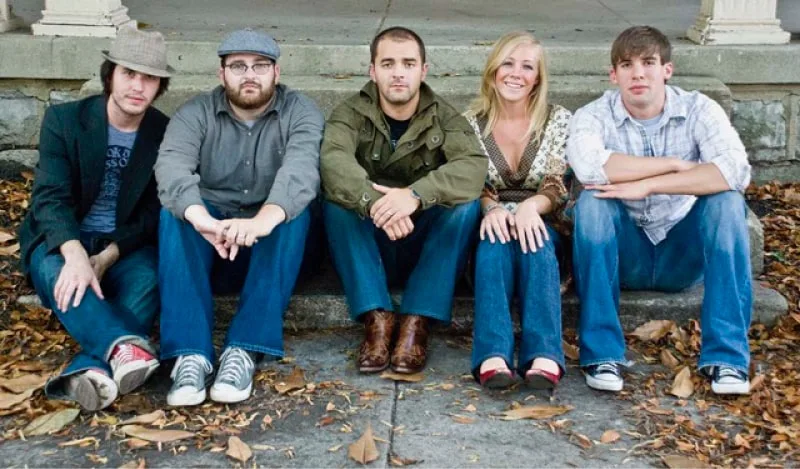
The financial runway was tenuous but just enough.
Drew found emotional runway, especially during the early days and bad gigs when it felt like no one cared, by consciously separating his personal worth from his music success, a foundation that that breakfast with his dad helped him build early on:
I always tried to make sure we didn’t find our complete identity in our job and our creative work. That’s a slippery slope to self-hatred, because if it doesn’t work, then you’re like, “I don’t have any value.”
In that conversation early on my dad said, “Remember this is really hard; very few people succeed. And if you don’t succeed, it’s not because you weren’t good enough. You also have to have lucky breaks.”
But, as Drew confirms, knowing that and actually living it are two different things. “It’s really easy to be like, ‘I’m terrible and I don’t add value, the world hates me’…It was a roller coaster still.” But that foundation, he says, “kept me from hanging out at the bottom.”
“Say goodbye to the past, now/”
He remembers what “the bottom” felt like when he released the first album they heavily invested in with his band. As an independent artist, Drew invests up front to create his albums. He called this one Passenger Seat and spent a lot of money on its promotion, even hiring a publicist.
I remember it came out and a week later it felt like no one cared.
They’d already booked a tour.
They decided to continue with the tour, but at that point, Drew was already formulating a Plan B.
We were barely making a living. And we’d incurred a little bit of debt making the record. It looked like the road was blocked.
He was grieved, to be sure, but also, “the glass has water in it.” He tried not to take it personally. He was proud of what they’d accomplished, like selling out the Hi Tone Cafe in Memphis and 3rd and Lindsley in Nashville. “So it wasn’t a total bust.”
But they were out of money. And their touring van died.
It was time to go to law school.
But Drew couldn’t afford it, so he decided to join the Marine Corps to help pay for law school.
He met with a recruiter and started physical training while he finished what he thought would be his band’s last tour.
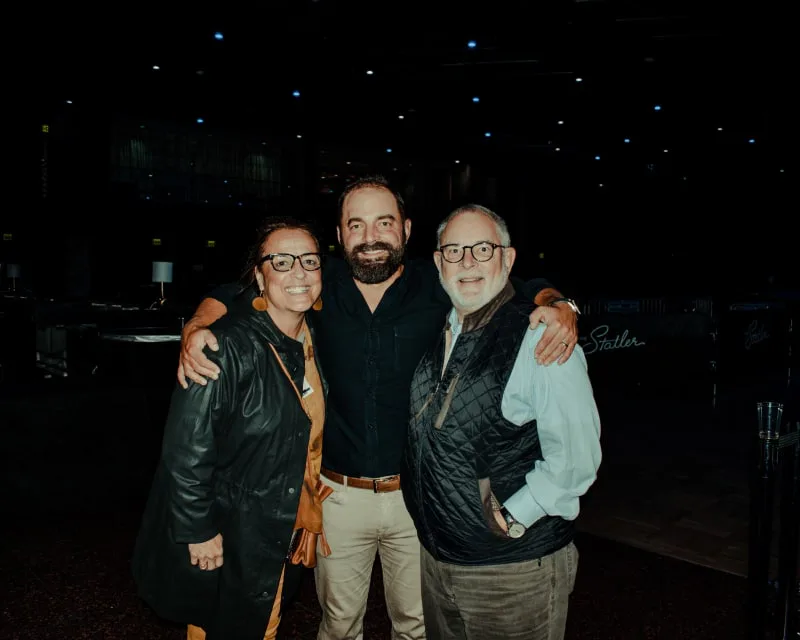
Drew’s sister and dad.
Around that time, he got a phone call that broke his heart.
His sister, who lived near Drew at the time along with her husband and three kids, called him to share that her husband got a job in Panama and they’d be moving.
Drew was happy for them, but crushed.
He loved being so close, and his nieces and nephew were deeply important to him; he loved them immensely.
And their effervescence played a vital role in helping him stay grounded, reminding him to separate his identity and worth from his artistic success: “It was always sweet to go see them and be reminded that we’re loved and cared for even when we’re not selling tickets and records.”
He was heartbroken, and just like when he lost Jay, he turned to music. But this time, he could write his own.
He wrote a song in his grief, a kind of going away letter to his family. He wrote it in 10 minutes.
It was called “ Live Forever.”
“I want you to live forever/”
He recorded the song and made a music video featuring his real family. The video includes scenes of Drew playing the Hi Tone Cafe, at the piano side-by-side with his mom, and a scene of him and his entire family sitting in an old jeep in an open field; Drew holds a framed photo of Jay. There’s also a brief scene where Drew visits Jay’s grave. And throughout his wife Ellie plays piano in a field and sings. But as the video goes on, the primary footage that weaves through is of his nieces and nephew running through grass, flying on Slip ‘N Slides, and waving sparklers.
It was a song he wrote for himself. For his family.
But to his surprise, “Live Forever” got picked up by another family – a TV family – the new NBC show, Parenthood. It was the featured song that closed one of their emotional episode endings during its first season.
Then “Live Forever” got picked up by the NBA and used in a commercial that won a sports Emmy.
The song was launched in front of a big new audience, and people loved it.
So did the small, dedicated, fanbase he’d built up over the last seven years of touring. They really connected to the song and helped it get to number one on the singer/songwriter iTunes chart before it was picked up by the TV show.
Then the Parenthood placement launched it to number 10 in the overall chart.
That’s when Drew realized in trying so hard to “make it” financially, especially when he focused on writing songs he thought could work for TV instead of for himself, he’d lost a little bit of what got him started in music in the first place. Getting songs placed in TV shows helped them financially survive in those early years, so it made sense that he focused on writing from that business-focused place for a time. But, he realized:
“Live Forever” came out of a completely different headspace. It was just me in the moment writing something about love, because of this personal thing going on.
So that was a good reminder of: Write and create the best work you can for the right reasons, and then let the chips fall.

Instead of going into the military or applying for law school, Drew used the money from Parenthood to buy a new touring van and trailer.
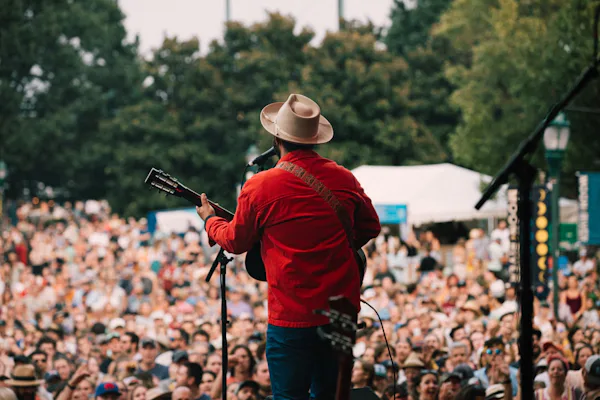
Ph: Cora Wagoner.
And instead of showing up to small venues to play for 50-60 people, they were now playing for over 200 people – the venues filled to the brim.
And everyone there was “all in”, something performers can feel from the stage. Drew was used to playing shows where people were mostly hanging out in the back with some beers, him “singing like you have to prove something.”
Now, people were crowding the front of the stage, singing along to everything.
The audiences came for “Live Forever”, but when he played his older songs, he noticed they knew the words to those too. “Live Forever” introduced them to him, but from there they engaged with the work he’d been creating all along.
It was the first time Drew thought maybe this really could be his career.
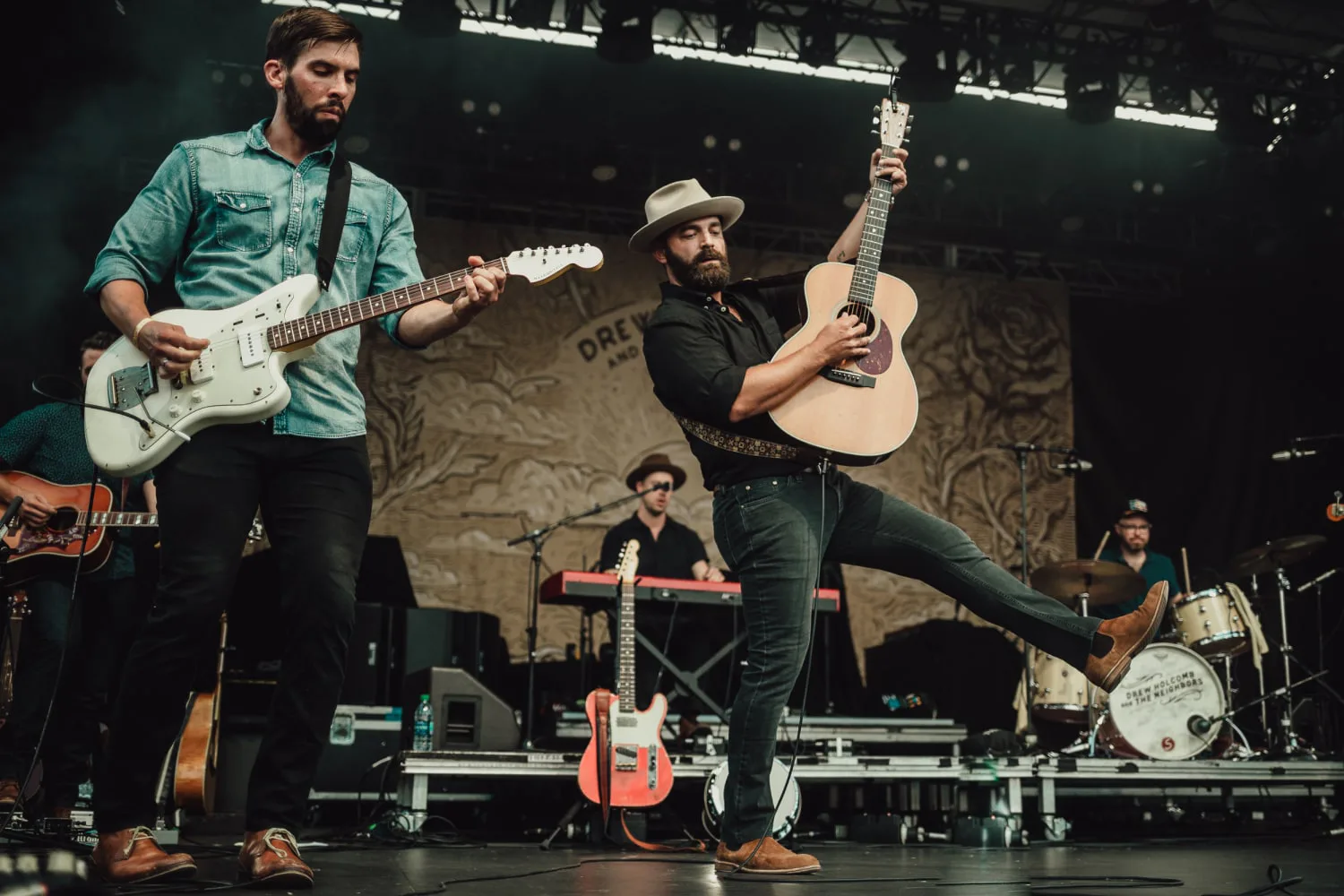
Ph: Cora Wagoner.
“Don’t listen to the critics/”
[Content warning: this section mentions a story about suicide.]
It was also when he finally realized that a creative career was about “trying to find your audience, not trying to find any audience. You don’t have to find every music fan in the world, you just need to find enough of them to keep it going.”

I’d rather have a million Spotify listeners and make the music that I want to make, versus having 30 million Spotify listeners and make music that I’m not proud of.
He didn’t always feel that way, especially in the early days. He remembers that deep sense of “chasing” something, the constant beat of “I want more people like me. I want to sell more records.”
But ironically, he sold more records and more people liked him when he created from a place of quiet, where the only voice he could hear was his own.
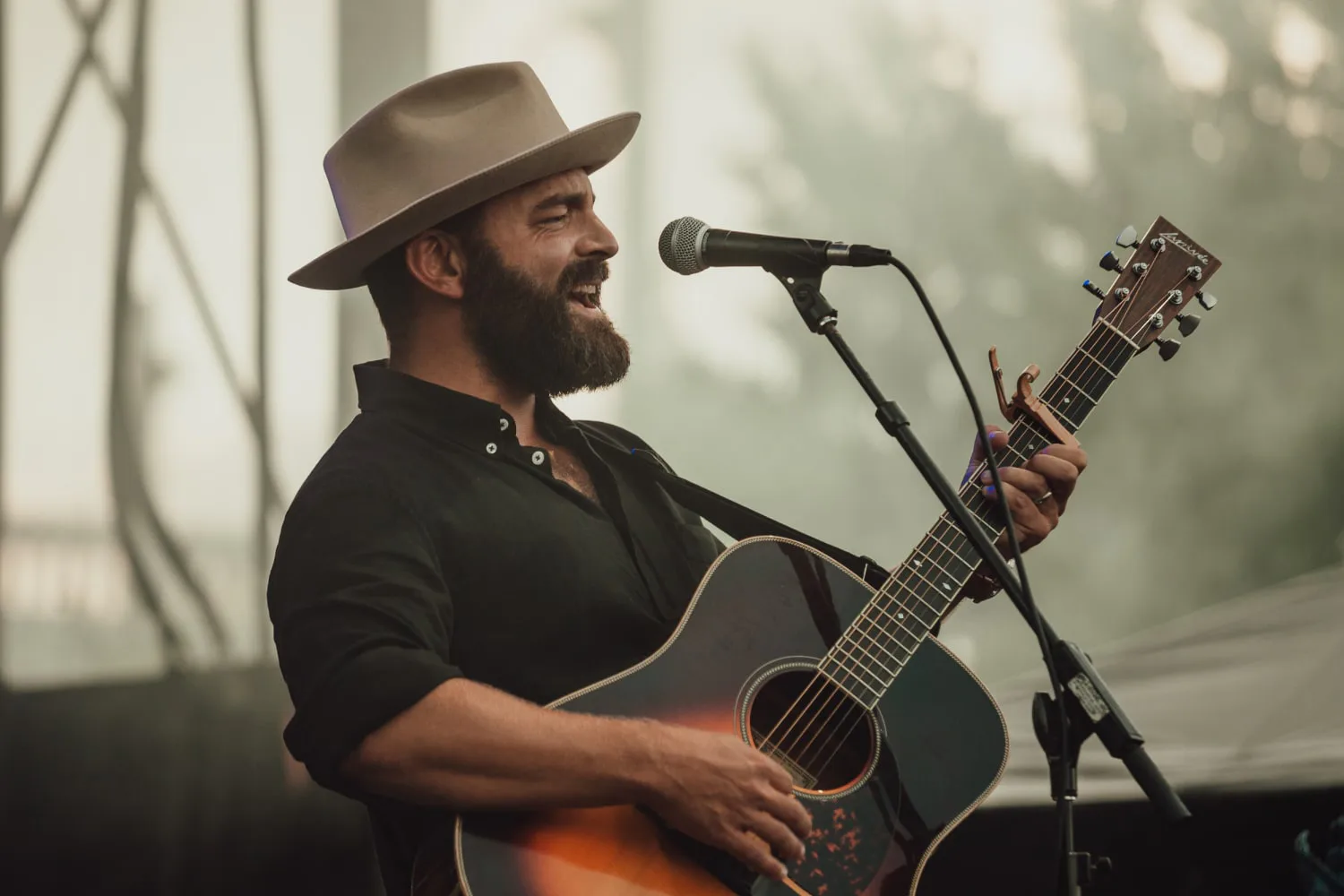
Ph: Cora Wagoner.
So much so that sometimes before he plays a song, after telling its origin story, he’ll say, “I hope you like it, but if you don’t like it, I don’t care.”
It’s said matter-of-factly and not rudely. It’s hard to detect ego there too. Instead it’s said with a kind of calm assurance you can’t help but aspire to – the tone of someone who values their own opinion on their art as much, if not more, than they value the opinions of others.
But how does he create without worrying about what other people think when what other people think of his art is essentially what pays his bills?
I had to learn the hard way like everybody does. It’s impossible for your work in any field to appeal to everybody. There are billions of ears in the world, they’re not all going to like what I do and that’s okay.
He remembers opening for other bands where one person would be so into his set and the person next to them looked like they couldn’t wait for it to be over.

Ph: Jordan S. Conner.
And then there’s social media, where one comment might say how a song changed their life, next to another that says that same song is terrible.
Drew learned to let go of what everyone thought and instead cared more about what he thought, hoping the right people would care too.
Drew got a letter once from a woman who shared the story of the night she’d decided to kill herself.
She got everything ready and had a random playlist playing on her phone – many of the songs, she told Drew, were taking her to a darker and darker place; but then “Live Forever” came on, and, as she wrote it to Drew, “your song popped up and it made me change my mind.”
Drew never dreamed of getting a letter like that, and while he doesn’t take credit for saving her life, he was blown away by her courage, and thankful for the reminder of what music can do, the same thing it did for him all those years ago when he lost Jay.
“Go slay all the dragons that stand in your way/”
However, making art purely from the heart and letting the chips fall goes both ways. Sometimes, the chips don’t fall where you want.
In 2017, Drew released an album called Souvenir, which he describes as “a real artist’s artist record; we wrote the songs that we wanted to write. Took a lot of chances on the writing side and production side.”

All of a sudden, the steady growth that had been happening since “Live Forever” took a hard dip.
Touring numbers were down; they played to rooms at 60% capacity, some 30%.
And every time we’d play songs from the new record, people were kind of just like yeah cool, play the old stuff.
They were also running out of money again, since this record wasn’t bringing in what they needed to pay off the investment (still an independent artist, Drew works with distributors, and invests in all his records himself).
“I guess this is it,” he thought once again. “I gave it a good 15-year run, and this is how it ends.”
He remembers sharing this with his friend, 22-time Grammy-award-winner Vince Gill (a friendship that developed over a mutual love of music and golf). Drew poured his heart out about his demise to Vince; Vince listened and then replied very matter-of-factly: “Oh yeah, yeah, some of my favorite records nobody cared about, you just gotta make another one.”
It was a great reminder. So that’s what I did. I doubled down on the work. There’s only certain things you can control, and one of those is your work.
I would usually write 30 or 40 songs in a 6-month period of time, record them, put out a record, tour it, and then wait until that season was over to start writing again. So instead I just started writing two or three days a week for two years straight.
That became his next album, Dragons, which has been their most successful record to date. 
“Take courage when the road is long/”
In 2019, Rolling Stone called Drew “fiercely independent” and said that he “has quietly become one of Americana music’s most reliable artists.”
By the time that feature was released, Drew had been writing and releasing songs for 16 years.
As Drew shares in his Creator Session:
It’s going to take longer than you think.
So be patient. Everything I thought I wanted early in my career that I wasn’t getting came at the right time later. And had it come earlier, I wouldn’t have appreciated it or it wouldn’t have had the impact on me and my career that it did.
For Drew, the biggest dream come true moment was playing to a sold-out crowd at the historic Ryman Theater in Nashville. He’d seen over 40 shows at that venue but never dreamed he’d play it.

Though he laughs when he tells me how some friends of his parents still ask “So how long is Drew going to do this music thing?”
But when he sold out the Orpheum theater in his hometown, most people realized, “Oh, this is not just some youthful diversion, this is Drew’s calling.”
Though, of course, he doesn’t much care what they think.


Lyrics above from “ Dragons”, “ You Want What You Can’t Have”, “ End of the World”, and “ Live Forever.”
